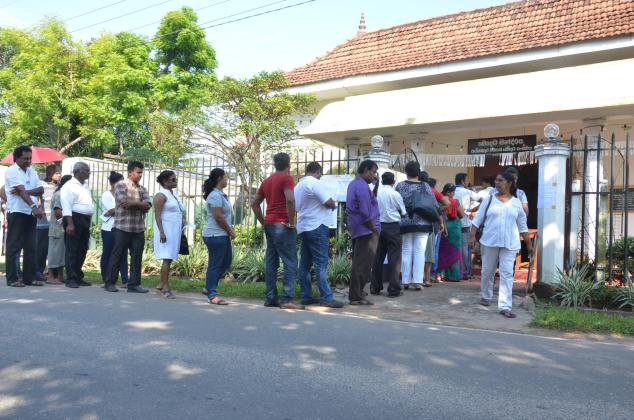
Sri Lankan Electoral Commissioner Mahinda Deshapriya Sets the Bar High
By Vasu Mohan, IFES Regional Director, Europe and Asia
A key ingredient to organizing elections with integrity is electoral leadership: the ability and willingness of election commissioners to lead with integrity, courage, and efficiency when faced with tough situations. Take for example the Commissioner of the Sri Lankan Department of Elections, Mahinda Deshapriya.
Under Commissioner Deshapriya’s leadership, the Department of Elections managed the August 17 parliamentary elections, which were vigorously contested. Powerful players and interests were at stake – both domestic and international. There were significant concerns as to whether candidates would have a level playing field, and whether there would be violence, fraud and/or abuse of State resources. However, thanks to Commissioner Deshapriya’s fair, ethical and bold leadership the election took place in an overall free and fair manner and the integrity of the electoral process was preserved.
Mahinda Deshapriya is a veteran election official of Sri Lanka who joined the Department of Elections in 1983. He rose through the ranks of the department and took the office of Commissioner of Elections in 2013. At that time, Sri Lankan public and political actors did not know what a formidable professional had assumed the role of elections head. He was praised for conducting presidential elections in January 2015 with great integrity. But the question remained, would he be able to do it again?
In the lead up to the parliamentary elections, Commissioner Deshapriya used powers that election laws and regulations provided him to an unprecedented extent. He ordered the seizure of State vehicles that had not been returned by former Parliamentarians to prevent abuse of State resources. He instructed the media to stop repeating telecasts of the President’s July 14 speech where he takes a stance against the former President, to avoid undue influence around the election.
Commissioner Deshapriya emphasized that employees should be granted leave to vote and that public employees be allowed at least four hours’ leave, with additional time if their workplace is more than 40 kilometers from their polling booth. He took affirmative steps to provide voters with disabilities special transport to and from the polls. Commissioner Deshapriya also enforced regulations to ensure that places of worship are not used for campaigning activities. Under his leadership the Department instituted and publicized a mechanism using SMS technology to lodge election complaints. There were widespread reports of complaints being addressed immediately. “In the polling booth I went to, I saw that there were candidate numbers and names printed on a small pieces of papers scattered all over. I called the hotline and within 30 minutes police came and cleared all of it,” one voter reported.
Commissioner Deshapriya was under extraordinary pressure during the elections, however, he acted with great integrity and courage. No wonder that in a July 2015 survey by the Center for Policy Alternatives, the Department of Elections comes out as a widely trusted public institution. In 2015, 62.3 percent of polled Sri Lankans said that they had a great deal or some trust in the election management body, up from 38.6 percent in 2014.
Electoral leadership is cultivated through constant self-examination, a desire to learn, a deep aspiration to serve, and a commitment to highest levels of ethics in public service. There is no doubt that that the August 17 elections will consolidate the credibility of the electoral process in Sri Lanka. Commissioner Deshapriya has set the bar high for future electoral leaders in Sri Lanka.










